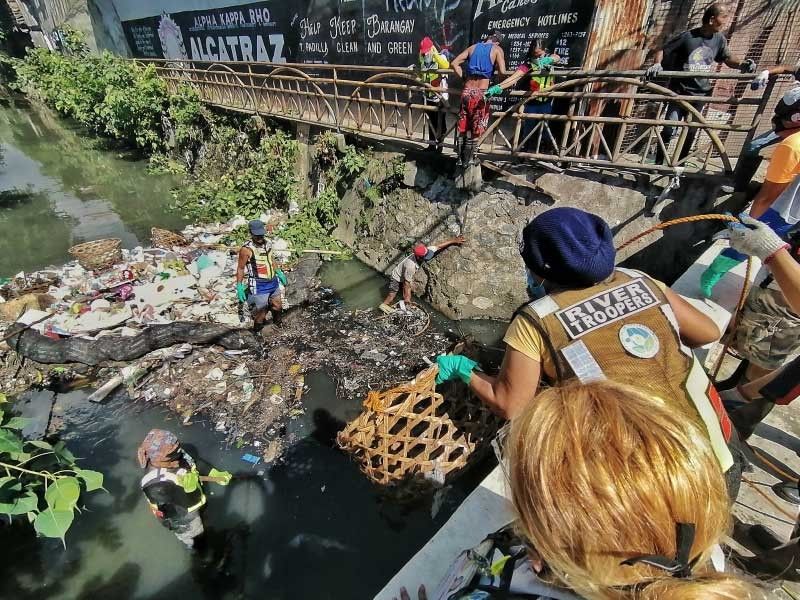Groups: Ban single-use plastics

CEBU, Philippines — Close to 30 advocacy groups are calling on the Cebu City government to immediately ban single-use plastics and enforce a holistic approach in waste management to address the garbage problem and mitigate flooding.
The floods the city experienced last October 13 saw tons of garbage, mainly plastic bottles that have clogged up the waterways, along with the illegal structures on riverbanks and creeks.
Mayor Edgardo Labella said he would meet with the bottled water manufacturers to ask them to provide recycle bins for empty water bottles as well as come up with possible other solutions to solve the problem.
But various groups believe that requesting bottled water manufacturers to provide recycle bins is not a lasting solution to the problem. These groups include Break Free From Plastic PH Project, Philippine Earth Justice Center, Inc., Philippine Movement for Climate Justice, Communities for Alternative Food Ecosystems Initiative, Regional Center of Expertise on Education for Sustainable Development, Cebu (RCECebu), President Children’s Paradise Montessori School, Sanlakas Cebu, EcoWaste Coalition, 5 Pieces Daily Habit, Basura Run, Tumbler of Hope, Si.Puk (Sikad.Pukaw), Green Releaf, Cebu Farmers Market, Bliss Yoga 7, Reflexotherapist KASAMA, Orgonise Maharlika PH, Cebu Food Revolution,KidsLife Foundation, Art Cebu, University of San Carlos Supreme Student Council, Carolinian Environmental Society, Kaabag sa Sugbo Foundation, Pagtambayayong Foundation, Seeds of Transformation, Cebu Woman’s Club and STEP Philippines.
“We believe that lasting solutions to the garbage problem and plastic pollution in Cebu City rest not in requesting bottled water manufacturers to set up garbage bins in key areas but on totally banning single-use plastics in the city.”
The groups also doubt that the move to put up trash bins in key areas to facilitate collection and transportation of plastic bottles to materials recovery facilities (MRFs) is really existing, if not, if it is truly capable of absorbing the sheer volume of plastic bottles disposed daily.
“It is clear that this measure will not guarantee the reduction of plastic wastes, but only incentivizes bottled water companies to produce more plastic bottles, leaving the city the duty of acquiring these plastic wastes and paying for their disposal instead of the manufacturers of these wastes themselves owning up to their responsibility,” they said.
Even the existing methods of recycling plastic bottles like the eco-bricks which are made by filling in PET bottles with used sachets and other plastic residuals is also said to be harmful as well as according to the Global Alliance for Incinerator Alternatives (GAIA), these construction materials derived from plastics “will eventually break down and enter the natural environment as micro plastics due to product wear and tear.”
“If this happens, toxic substances can leach and accumulate in water sources, contaminating drinking water, fisheries, and agricultural land and grave hazard to the environment and human health.”
According to them, there is a need to ban single-use plastics and styrofoam food packing as soon as possible and not just banning of plastic shopping bags on certain days of the week and an aggressive information and education on the proper implementation of the program should be done.
The groups are not also open to the waste-to-energy incineration project as they say, is also not a sustainable solution.
The lack of garbage segregation at source and the lack of MRFs are major reasons why unsegregated solid wastes collected from households, business establishments, and other sources go straight to the transfer station in Barangay Inayawan or the private landfills in Barangay Binaliw, Cebu City and in the municipalities of Consolacion and Aloguinsan, bringing with them a host of environmental and social issues.
The city, thus, needs to ensure segregation from source to final disposal and institute clear diversion program, they said.
“The responsibility of ensuring segregated transportation of collected wastes rests on public officials, from the city and down to the barangay level, because solid waste management personnel such as garbage drivers and loaders are under the direct supervision of the Department of Public Services (DPS) in the case of city personnel, or by barangay officials in the case of barangay drivers and loaders. Even if “solid waste will go to a specific company,” they added.
The groups are challenging the city government of Cebu to “lead by example” while barangays should also have their own regulations pertaining to proper solid waste management. — FPL (FREEMAN)
- Latest






















